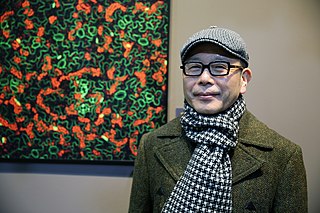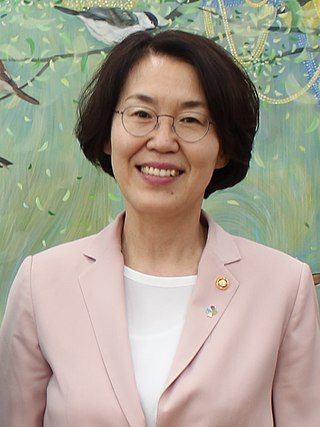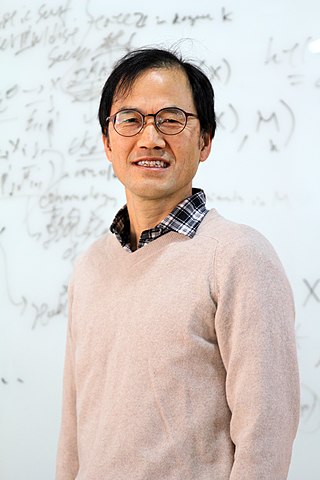Related Research Articles

The 2010 K League, officially known as Sonata K-League 2010, was the 28th season of the K League. It was sponsored by Hyundai Motor Company, and was held from 27 February to 5 December 2010.

Noh Tae-won is a South Korean physicist and director of the Center for Correlated Electron Systems (CCES) in the Institute for Basic Science (IBS) at Seoul National University (SNU). He has published more 400 papers and been cited 15,000 times. He is a member of the Materials Research Society, Korean Optical Society, Korean Crystallographic Society, and Association of Asia Pacific Physical Societies and been on several editorial boards for journals. In 2017, he became president of the Korean Dielectrics Society.

Cheon Jinwoo is the H.G. Underwood Professor at Yonsei University and the Director of the Center for Nanomedicine, Institute for Basic Science (IBS). As a leading chemist in inorganic materials chemistry and nanomedicine Cheon and his group research chemical principles for the preparation of complex inorganic materials. He has been a Clarivate Analytics Highly Cited Researcher both in the field of chemistry in 2014, 2015, 2016 and cross-field in 2018. He is a fellow of the American Chemical Society, Royal Society of Chemistry, and Korean Academy of Science and Technology, a senior editor of Accounts of Chemical Research and an editorial advisory board member of Journal of Materials Chemistry, Nano Letters and Materials Horizons.

Daegu Gyeongbuk Institute of Science and Technology (DGIST) is a public science and engineering university located on Daegu Technopolis, Daegu, South Korea. DGIST is one of the four public universities in South Korea dedicated to research in science and technology, along with KAIST, GIST, UST, and UNIST. Under the Special Act on Support of Scientists and Engineers for Strengthening National Science and Technology Competitiveness, the Korean government enacted the Daegu Gyeongbuk Institute of Science and Technology Act and founded DGIST in 2004 as a research institute. In 2008, the act was amended to extend the role of the institute to both research and education, which eventually enabled a transition from research institute to university for DGIST.
Song Ja is a South Korean politician and academic. He has served as chancellor of Yonsei University and Myongji University, and as Minister of Education.

Eunjoon Kim is a professor of KAIST and director of Center for Synaptic Brain Dysfunctions within the Institute for Basic Science (IBS). His current research focuses on molecular mechanisms underlying autism spectrum disorders and synaptic brain dysfunctions. With over 200 publications to his name, his research has been cited over 27,000 times giving him an h-index of 81. He graduated from Busan National University in 1986, received master's degree at KAIST in 1988, received PhD degree at Michigan State University in 1994, and worked at Harvard Medical School as a postdoctoral fellow during 1995-1996. His current research focuses on molecular organization of neuronal synapses and synapse dysfunction-related psychiatric disorders.

Hong Gil Nam is a South Korean biologist teaching in the Department of New Biology of Daegu Gyeongbuk Institute of Science and Technology and leading research as director of the Center for Plant Aging Research. His research interests include comparative aging in diverse kingdoms, including plant and animals, to reveal aging mechanisms among species, cross-kingdom interaction between plants and animals, and biochemistry at nano and micro levels. He is the founder and former director of the Biological Research Information Center, a member of the Korean Academy of Science and Technology, and has served on the editorial board in Molecular Plant since 2013.

Shin Sung-chul is a South Korean physicist and the 16th president of KAIST. Shin was the first president of DGIST since it changed its form from a research institute to a university in 2011. His main research areas as a scientist are spintronics and nanomagnetism. As of June 2014, Shin is the founding president of DGIST university, Fellow Professor of University of Ulsan, a member of Presidential Advisory Council on Science & Technology (PACST), the chair of Committee for Future Strategy, PACST, and a Fellow of the American Physical Society (APS).

Koh Gou Young is a researcher from South Korea studying organ vasculature and lymphatic vessels with an interest in angiogenesis, lymphangiogenesis, adipogenesis, and cardiogenesis. His research has contributed to the publication of more than 200 journal articles, including multiple publications on how Tie2 deficits are related to sepsis, blood-retinal barrier damage, and an imbalance of intraocular pressure in Schlemm's canal which induces glaucoma.

Shim Hwa-jin is a South Korean academic specialising in the history of clothing and textiles. She was president of Sungshin Women's University from 2007 until 2017, when she was imprisoned for embezzlement.

The Center for Quantum Nanoscience was founded in 2017 as part of efforts for South Korea to expand basic science research. Classified as an Extramural Center of the Institute for Basic Science, it is hosted by Ewha Womans University in Seoul, South Korea. Their research focuses on exploring quantum properties of atoms and molecules on surfaces and interfaces and long-term goals of quantum sensing and quantum computation in those areas.

Oh Se-jung is a South Korean politician and physicist. He has served as the director of the Korean Federation of Science and Technology Societies, the first president of the Institute for Basic Science, and the 27th president of Seoul National University.

Noh Do Young is a South Korean physicist specializing in condensed matter physics and materials science using synchrotrons and XFELs. He has developed and applied various frontier X-ray diffraction methods to study condensed matter systems, including recent coherent X-ray diffraction imaging technique. His research has utilized a number of synchrotron radiation facilities, such as Advanced Photon Source, SPring-8, National Synchrotron Light Source, PLS, and X-ray free electron lasers, including SCALA and PAL-XFEL.

Choi Kiwoon is a theoretical particle physicist researching focusing on particle theory and cosmology. He was a research professor at Chonbuk National University and a full professor at KAIST. He is the founding director of the Institute for Basic Science Center for Theoretical Physics of the Universe. He is a member of the Korean Academy of Science and Technology.

Kim Doochul is a South Korean theoretical physicist. He was head of the Department of Physics, director of the BK21 Physics Research Division, and professor emeritus at Seoul National University. He was also a fellow and chairperson in the Korean Academy of Science and Technology before becoming the fifth president of Korea Institute for Advanced Study and the second president of Institute for Basic Science. He was a standing trustee with the Asia Pacific Center for Theoretical Physics and a board of Trustee member of the Korean Physical Society.

Oum Sang-il is a Korean mathematician working in graph theory and discrete mathematics. He is a tenured professor in the Department of Mathematical Sciences at KAIST and the chief investigator of the Discrete Mathematics Group in the Pioneer Research Center for Mathematical and Computational Sciences at the Institute for Basic Science. He is known for his work on structural graph theory and in particular for structures and algorithms relating to rank-width, clique-width, and branch-width. He published more than 45 journal papers.

Roe Jung-hye is a South Korean professor of Molecular biology at Seoul National University served as the 6th President of National Research Foundation of Korea - the first woman to lead the Foundation or its preceding foundations from 2018 to 2021.

Lim Hye-sook is a Korean electronics engineering professor at Ewha Womans University served as Minister of Science and ICT under President Moon Jae-in from May 2021 to 2021. Lim was the first woman to lead the country's science ministry.

Oh Yong-Geun is a mathematician and distinguished professor at the Pohang University of Science and Technology and founding director of the IBS Center for Geometry and Physics located on that campus. His fields of study have been on symplectic topology, Floer homology, Hamiltonian mechanics, and mirror symmetry He was in the inaugural class of fellows of the American Mathematical Society and has been a member of Institute for Advanced Study, Korean Mathematical Society, and National Academy of Sciences of the Republic of Korea and is on the editorial boards of Journal of Gokova Geometry and Topology and Journal of Mathematics of Kyoto University.
National Scientist of the Republic of Korea was an award bestowed between 2005 and 2012. The prize was established by the Ministry of Education, Science and Technology to achieve the world's best research results by providing research funds of 1.5 billion KRW per year to a total of 10 scientists. Research prize funding ended when their affiliation changed. Envisioned as the highest scientific award of the nation, it was initially presented to Hwang Woo-suk in 2005 under the name Top Scientist (최고과학자) with an annual funding prize of 3 billion KRW given over three years. Due to his scandal, the award was withdrawn from Hwang, the name of the prize was changed and the research funding was reduced. The reformed award was given in 2006, 2007, 2010 and last bestowed in 2012. The end of the award coincided with the founding of the Institute for Basic Science with five laureates changing their affiliation to the new institute.
References
- ↑ "More Moore or More than Moore Nano-Devices?". 2014 Session NANO KISS (in Korean). Korean International Summer School on Nanoelectronics. 2014. Retrieved 13 February 2020.
- ↑ "국양 대학총장". Naver 인물검색 (in Korean). Naver . Retrieved 17 February 2020.
- 1 2 류, 은주 (18 May 2019). ""6번의 감사로 휘청거린 DGIST 바로잡겠다"". IT Chosun (in Korean). Retrieved 17 February 2020.
- ↑ ""스널프 스널피 복제늑대 맞다"". YTN (in Korean). 27 April 2007. Retrieved 17 February 2020.
- ↑ 김, 만기 (1 April 2019). "DGIST 4대 총장에 국양 삼성미래기술육성재단 이사장". The Financial News (in Korean). Retrieved 17 February 2020.
- ↑ 정, 재훈 (26 March 2019). "DGIST 제4대 신임 총장에 국양 이화여대 초빙석좌교수 선임". ET News (in Korean). Retrieved 17 February 2020.
- ↑ 김, 하연 (6 September 2018). "이화여대, 양자나노과학분야 석좌교수로 국양 교수 초빙". Veritas Alpha (in Korean). Retrieved 17 February 2020.
- ↑ "이화여대, 양자나노과학연구소 석좌교수로 국양 현 삼성미래기술육성재단 이사장 초빙". Kyosu Shinmun (in Korean). 11 September 2018. Retrieved 17 February 2020.
- ↑ 이, 민종 (6 September 2018). "이화여대, 양자나노과학 연구 박차...세계적 권위자 국양 교수 석좌교수로 초빙". Munhwa Ilbo (in Korean). Retrieved 17 February 2020.
- ↑ 백, 두산 (7 September 2018). "이화여대, 양자나노과학분야 석좌교수로 국양 교수 초빙". Asia Times (in Korean). Retrieved 17 February 2020.
- ↑ "Team Leaders". Center for Quantum Nanoscience. Archived from the original on 22 March 2019. Retrieved 13 February 2020.
- ↑ "Biography: Young Kuk, Ph.D." Daegu Gyeongbuk Institute of Science and Technology. Retrieved 14 February 2020.
- ↑ 김, 상연 (23 September 2008). "[초대석]인촌상 자연과학부문 수상 국양 서울대 물리학부 교수". DongA (in Korean). Retrieved 14 February 2020.
- ↑ 김, 태식 (9 September 2008). "제22회 인촌상에 서남표 총장 등 선정". Naver (in Korean). Yonhap News Agency . Retrieved 14 February 2020.
- ↑ 이, 준기 (1 April 2019). "국양 DGIST 신임 총장 선임". Digital Times (in Korean). Retrieved 14 February 2020.
- ↑ 윤, 신영 (26 March 2019). "DGIST 4대 총장에 국양 삼성미래기술육성재단 이사장 선임". Donga Science (in Korean). Retrieved 14 February 2020.
- ↑ 이, 정내 (26 April 2004). "'닮고 싶고 되고 싶은 과학기술인 10인' 선정". Naver (in Korean). Yonhap News Agency . Retrieved 17 February 2020.
- ↑ 민, 태원 (26 April 2004). "'닮고싶은 과기인'… 과기부,3개분야 10명 선정". Naver (in Korean). Kukmin Ilbo . Retrieved 17 February 2020.
- ↑ "DGIST 4대 총장, 국양 삼성미래기술육성재단 이사장 선임". Naver (in Korean). DGIST. 4 April 2019. Retrieved 17 February 2020.
- ↑ "[이화여대] 세계적 나노과학 선구자 국양 교수 초빙". Naver (in Korean). Ewha Womans University. 6 September 2018. Retrieved 17 February 2020.
- ↑ "EW Müller Outstanding Emerging Scientist Award". International Field Emission Society. Retrieved 17 February 2020.